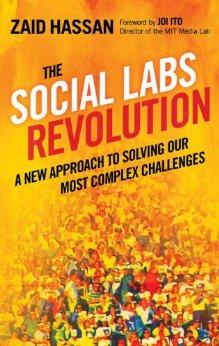A Social Labs Revolution in the Making
Planning is killing us and prototyping will save us
- that's the provocative premise of a new book from Zaid Hassan, cofounder of Reos, and host to a small but mighty group of activists, facilitators, designers and social entrepreneurs that I joined earlier this month for a workshop at the Lokey Graduate School of Business at Mills College.

As a nonprofit consultant and participant in over a dozen strategic planning processes, I've seen the limitations of traditional planning approaches first-hand. The difficulties are confounded when the planning centers on navigating situations or challenges of complexity, where the actions undertaken will inevitably produce reactions from multiple stakeholders and result in a fundamentally new situation.
The startup community, by and large, gets this. The social sector - or at least the funding institutions within the social sector - mostly does not.
For all the talk and activity around Lean Impact, most of the innovation-focussed philanthropic resources are still being passed out to plans constructed within a traditional planning paradigm. Even when the focus is on allegedly on the outcomes, the desire for accountability often results in the imposition of a planning methodology that values presumptive specificity over messy reality (#imho).
Furthermore, the societal challenges we face today are incredibly complex. From climate change to global poverty, from infectious diseases to cyber conflict, the world has never been more interconnected and never been more unsuited to taking on those challenges within a planning paradigm. What are some alternatives?
Hassan laid out a blueprint for what he calls Social Labs - interdisciplinary teams empowered to explore a portfolio of proposed solutions to a particular social or environmental challenge. They do this not by writing white papers or convening blue-ribbon panels, but rather by doing - by working to prototype the implementation of promising ideas in 30- or 60-day sprints. This approach, much like Upwell's own MVC (minimum viable campaign) model of campaigning, draws heavily from agile software development and recognizes that only by getting out of the building (or conference hall) can you test your ideas with real fidelity.
Here's a description in his own words: [UPDATE: the video embed has gone astray - here's Zaid on YouTube]
If you know you're almost inevitably going to fail, then the point is to learn from failure as quickly as possible in order to move forward. Hassan and Reos have brought forward a truly promising approach to big, thorny, complex problems.
I'll be watching their progress with interest, but more importantly with my sleeves rolled up.
Add a comment